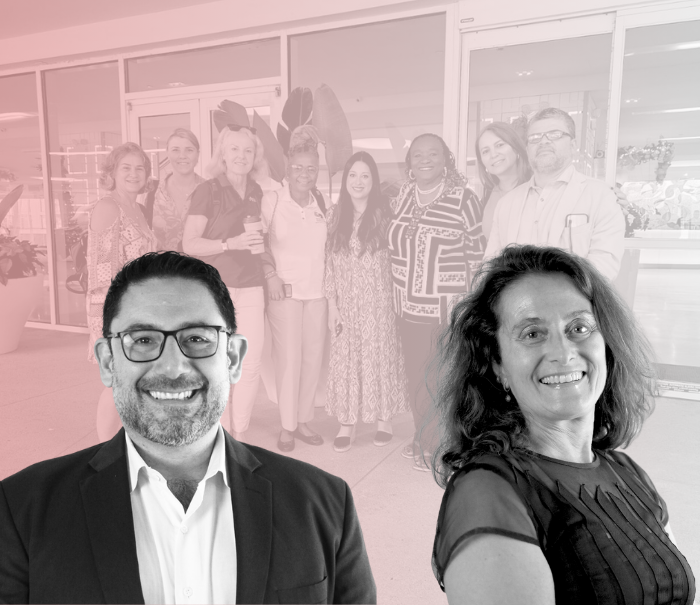Diego and ADI CEO Paola Barbarino took part in several days of action which saw numerous meetings with key figures in the Puerto Rican Government and culminated in attending the 14th Conference of Alzheimer Ibero America.
“The ADI Members in the Caribbean and Latin American meeting was the highlight of our recent visit to San Juan, Puerto Rico. For both Paola and I, it was a transformative experience. Transformative because, it was a gathering that presented both challenges and valuable insights through the diversity of languages and cultures among the participants. The differences provided a rich learning experience, symbolizing the unique amalgamation of perspectives and backgrounds, that is not only representative of the region, but also of ADI as an organisation.” Diego stated on reflecting on his time in Puerto Rico.
Now more than ever, it is vitally important to raise awareness about dementia in this region, The number of cases is expected to grow dramatically, especially in the Caribbean, with this region alone set to reach over 744,000 by 2050. Of all the people living in the Latin American and Caribbean region, there are approximately 14 million people who are living with dementia. ADI is working with Puerto Rico and throughout both of these regions on the issue of National Dementia Plans, unfortunately, of the 35 countries that comprise of Latin America and the Caribbean, only 8 have national plans.
Diego continued: “To continue our work on this cause, during our stay we met with key figures in Puerto Rico’s government, including Caridad Pierluisi, the Director of the Executive Office of the Governor and acting First Lady. This meeting provided an opportunity to discuss the importance of collaboration in addressing dementia challenges, emphasizing the need for a united front. Subsequent meetings with the Secretary of Health, Dr Carlos Mellado López, and the Director of Healthy Aging, Dr Marilú Cintrón, further underscored the commitment of Puerto Rico to help people who receive a diagnosis through initiatives like the Center for Alzheimer’s and Other Dementias.”
Paola and Diego also took time to speak with television station, Telemundo Puerto Rico about the importance of the National Dementia Plans and the context of the national and global challenges that dementia poses.
Paola told reporters: “dementia is a social issue as well as a health issue and are both very important. As a global situation, dementia can be felt acutely on a national level, adding pressure on financial systems as well as on healthcare systems.”
The financial cost of dementia on an international level is rarely addressed or considered by national governments, however we know that within just ten years, by 2030, the annual global cost associated with dementia is predicted to more than double, growing to US$ 2.8 trillion.
Participating in the 14th Conference of Alzheimer Ibero America, ADI organized a symposium highlighting our members’ work in Latin America and the Caribbean. Diego described the details of these special events within the conference. “The symposium featured exemplary practices, including the presentation of the ZELAR Online Training Program by FEBRAZ, ADI’s Brazilian member, and the showcase of a state-of-the-art Alzheimer’s Long-Term Facility by ADI’s Ecuadorian member, Fundación TASE. We also co-hosted a symposium in collaboration with Otsuka. This session shone a light on stories from the Latin American community in the United States, skillfully moderated by researcher Paula Muller. The experiences shared by Myra Solano, a person living with Alzheimer’s, and Carlos Olivas, a devoted caregiver, added a human touch to our discussions, emphasizing the profound impact of dementia on individuals and their families. When we speak globally, internationally and nationally, we must never forget the voice of those with lived experience of the condition and of care provision.”
Amid the sessions of the conference, Paola and Diego also conducted personalized one-on-one meetings with our members. This approach ensured that our discussions, particularly focused on each association’s progress in dementia policy, were seamlessly integrated into the conference schedule, maximizing the opportunity for in-depth and tailored engagements with each member.
Puerto Rico’s unique position as part of the Caribbean, Latin America, and the United States symbolized a powerful convergence of diverse perspectives. It served as a beacon of unity and cooperation, exemplifying the spirit of South-South collaboration in addressing common challenges. The Members Meeting further emphasized this collaborative approach, with best practices presented by Corporación Alzheimer Chile, FEBRAZ, and insights from Norbel Román, President of the Costa Rican Council for Policy for Older Persons.
Local dementia champion Ana Gratacós played a pivotal role in ensuring the success of our visit, contributing to the warm hospitality that characterized Puerto Rico as a wonderful host. Puerto Rico not only showcased its commitment to supporting persons with dementia and their families, but also provided a symbolic space for everyone to come together, fostering South to South cooperation and collective efforts in our ongoing work in the Americas as a united whole.


